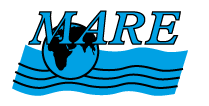Quicksilver Informal Educator of the Year
On May 9, 2007, Catherine Halversen received the QuickScience Ocean Science Leadership Award for Informal Teaching Excellence. The award is given by the University of Southern California—Quicksilver QuickScience Partnership to promote excellence in ocean science education. Catherine was awarded the honor based on her leadership in the development and implementation of the Communicating Ocean Sciences to Informal Audiences (COSIA) college course. Following is an excerpt from her nomination letter:
"Catherine Halversen is Co-Director of MARE: Marine Activities, Resources & Education and is the Director/Principal Investigator of the NSF-funded Communicating Ocean Sciences to Informal Audiences (COSIA) course at the Lawrence Hall of Science, University of California, Berkeley. Catherine has been an accomplished science educator in formal settings for many years. After teaching high school science, she became an author and curriculum developer for Project OCEAN and beginning in 1991, for MARE. The MARE curriculum is now used in over 700 elementary and middle schools nationwide. Over the past 18 months, Catherine Halversen has made a huge and remarkable contribution to informal/free choice science education through the development of COSIA."
"In 2002, as part of the Center for Ocean Sciences Education Excellence California, Catherine led a team that adapted and revised an existing college course for undergraduate and graduate science students at UC Berkeley into a new course called Communicating Ocean Sciences. The course introduces students to inquiry-based science pedagogy and learning theory, then places them in local schools to teach a six-week MARE unit in K-8 classrooms. The course was documented, evaluated and then shared with colleagues in universities across the country. The course is now being taught in 17 colleges and universities! Based on the success of the course, Catherine received a large grant from the National Science Foundation Informal Science Education program to further adapt the course to prepare students to teach ocean sciences to the public on the floor of aquariums and science centers. Communicating Ocean Sciences to Informal Audiences has already had a significant impact on the institutions teaching the course. The new COSIA course is being co-developed through the collaboration of Catherine’s team at Lawrence Hall of Science with several partnership sites nationwide. Each partnership site is comprised of a college or university where the course is actually taught and an informal science education institution where the students are placed to teach the public. The project funded five partner sites (Hampton University/Virginia Aquarium; Oregon State University/Hatfield Marine Science Center; Rutgers University/Liberty Science Center; University of Southern California/Aquarium of the Pacific; and University of California, Berkeley/Lawrence Hall of Science). As a testament to the early success of the project, three other sites have unexpectedly joined the effort by finding their own additional funds to support their participation (Scripps Institution of Oceanography/Birch Aquarium; Hawaii Community College/Kula Nai’a Foundation; and University of South Florida). All of the partners gathered in Berkeley in the summer of 2006 to participate in several days of professional development led by Catherine. This professional development was especially impressive since the target audience—the project partners—was a combination of accomplished ocean scientists and high level, expert informal educators. As a result, the course is being taught, documented and evaluated right now (winter/spring 2007) for the first time at all eight universities, and students from all eight are being deployed at the informal science institutions. Within a year, the course materials will be available for national dissemination."
"The impacts of COSIA are widespread. College students who represent the next generation of scientists are being prepared to more effectively communicate about the broader impact of their research, and to conduct rigorous education and public outreach efforts related to their research. University scientists co-teaching the course with informal education partners are gaining a new appreciation for the importance of education and outreach. Perhaps most importantly, the informal science education institutions in the project are developing new 'exemplary' activities for students to present on the floor of their respective aquarium or science center. These new exemplars are designed to demonstrate for the students teaching them, the very best, research-based practices in free choice learning. The activities are being developed collaboratively by all the COSIA partners, according to rigorous, agreed-upon criteria to ensure their quality. The activities are transforming the way that science is being taught at all the partner sites, and will soon be shared nationally in an on-line library accessible by any informal institution in the country."
"The success of COSIA is due to the hard work and diligence of Catherine Halversen, combined with her creative expertise and ability to work with all different types of partners from diverse institutions. The partners in the effort, most of whom did not know any of the other partners involved before they began, have moved forward with great alacrity and effectiveness, based largely on their trust of Catherine, her integrity, her keen ability to listen carefully and to assume strong leadership while valuing the contributions of others. The COSIA course and materials are imbued with Catherine’s deep knowledge and love of teaching. She is able to combine her theoretical understandings of how people learn with her natural ability to engage and inspire students of all ages. She has demonstrated a remarkable ability to apply what is known about learning in formal settings to improve education in free choice environments. She is not only an exceptional teacher, but she is able to distill good teaching into accessible lessons' that bring out the best teaching in others."
"Within the next several years, COSIA will no doubt have a lasting impact on dozens, perhaps hundreds more aquariums, museums and science centers, improving the quality of the teaching and learning within them while also helping to build important bridges based on mutual respect and collaboration between scientists and informal science educators. The program is a great tribute to Catherine’s leadership in informal science education."




